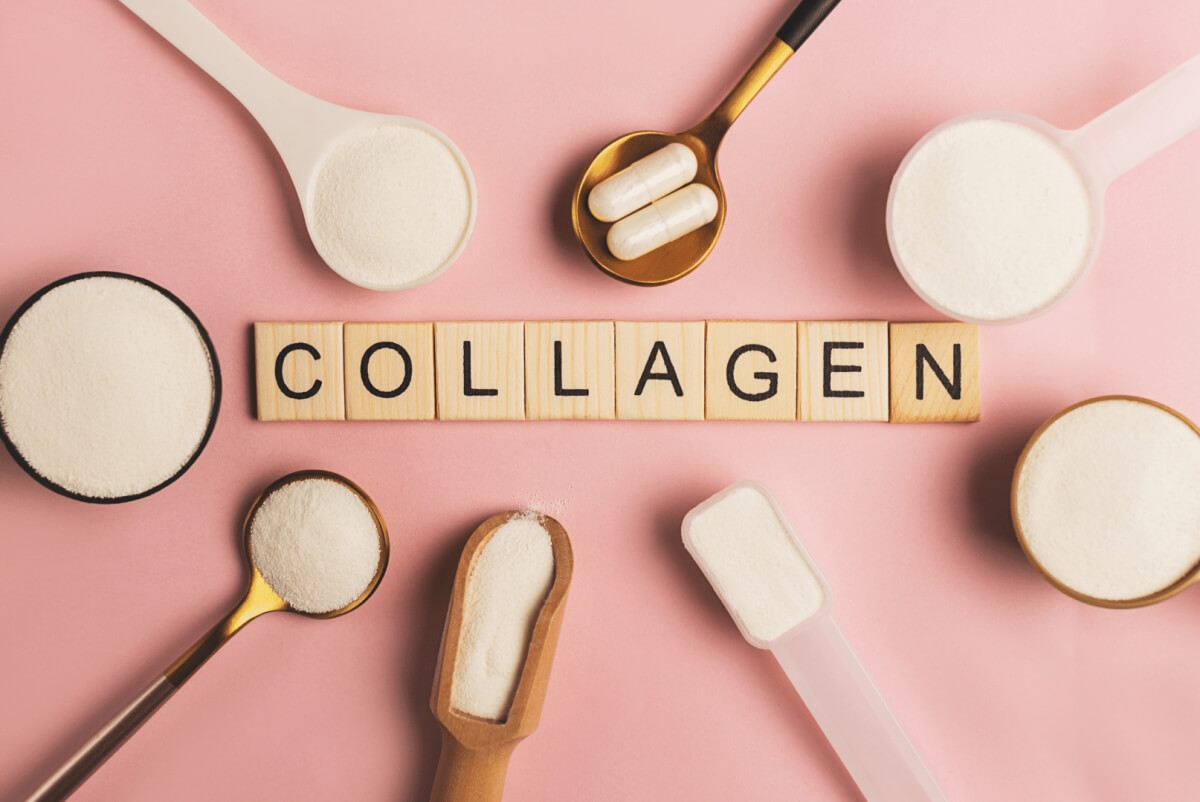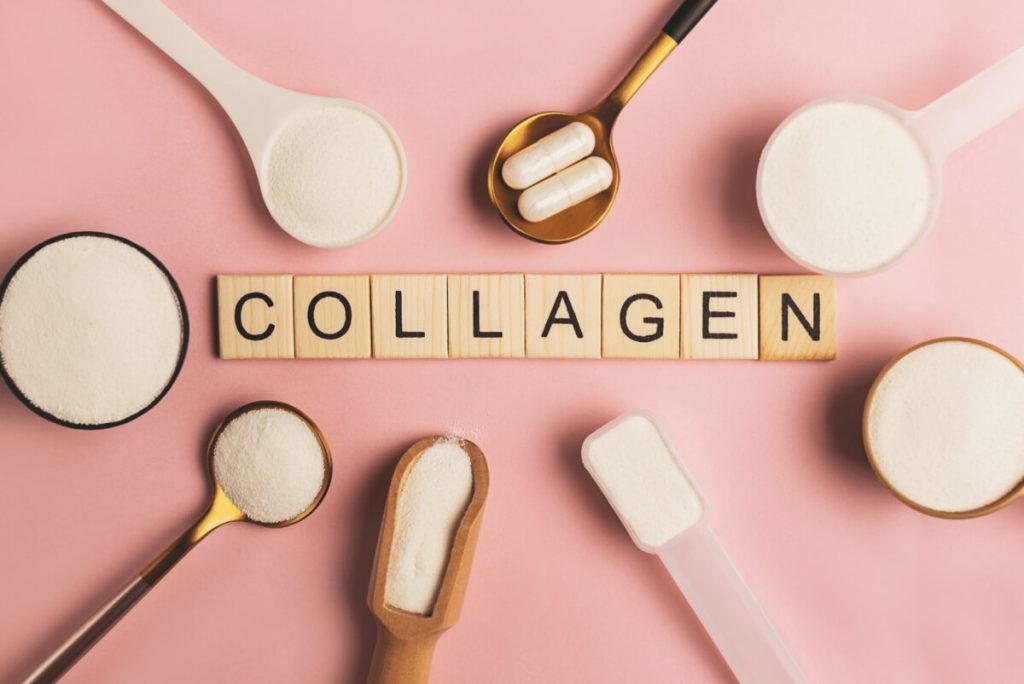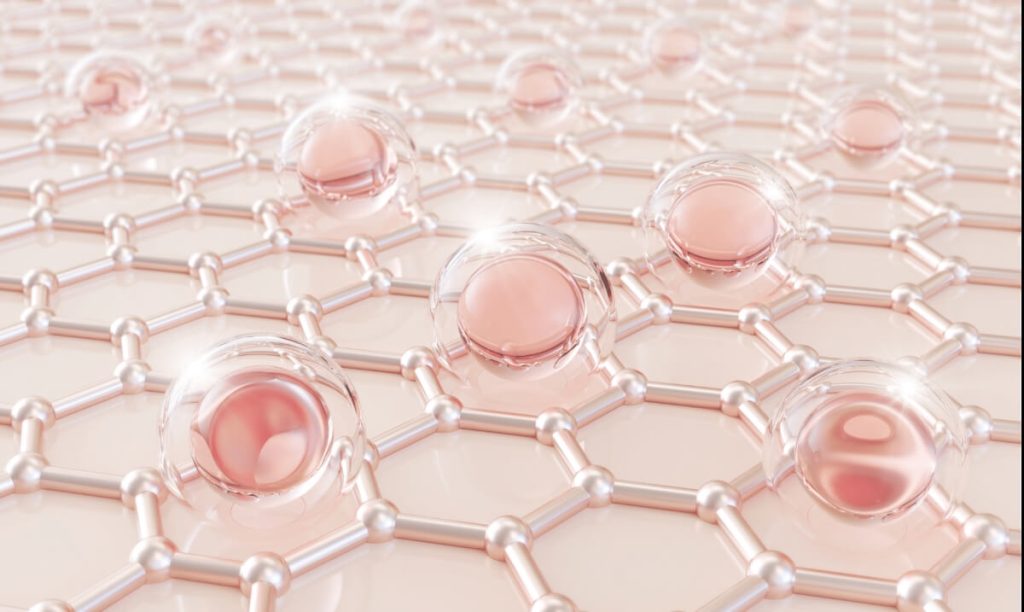
Collagen Supplements: Health Benefits, Side Effects, How To Take, And More


Collagen Supplements: Health Benefits, Side Effects, How To Take, And More
Yet, nowadays, most people are not eating enough collagen or its constituent amino acids, which can contribute to accelerated aging. In this article, we’re going to cover everything about it, including its health benefits and how to take collagen supplements.
What Is Collagen?

Collagen is the most abundant protein in your body, accounting for roughly 30% of the protein mass. It is the glue and scaffold that makes up the:
- Extracellular matrix
- Connective tissues
- Skin
- Tendons
- Ligaments
- Cartilage
- And bone
All collagens have a triple helix – 3 strands twisted around each other. The amino acid composition reflects high glycine content, as well as hydroxylysine and hydroxyproline. The first collagen investigations connect to its uses in gelatin and leather production
When referring to supplements, the term “collagen” means collagen peptides (see next section).
Collagen protein superfamily includes a total of 28 proteins (labeled according to Roman numerals), which come from 44 different genes. The main function of these proteins is structural support. However, collagen also works in keeping balance (homeostasis), cellular behavior, and sensory organs.
The 6 main types of collagens include:
- Type I is the most abundant type and occurs in skin, nails, tendons, bone, teeth, blood vessels, heart, and lungs.
- Type II is the principal component of cartilage, but is also present in the retina of the eye. In cartilage, it provides elasticity and tensile strength necessary to stabilize joints.
- Type III is in the skin, muscle, intestinal, and blood vessel walls acting as a structural support. It plays a role in blood clotting and wound healing as well.
- Type IV makes up all basement membranes, separating epithelial and endothelial cells. It also forms a non-fibrillar network and occurs in the smooth muscle. Some of its functions include cell adhesion, proliferation, and differentiation.
- Type V are in interstitial tissues, skeletal muscle, and the surface of blood vessels. Additionally, it acts as a connector between basement membrane and structural components of an organ
- Type VI is very important for brain structure and functions. It’s found in neurons and membranes that protect the nervous system. It also helps with the development of cells that wrap around neurons and support healthy nerve conductions.
What Are Collagen Peptides?
Collagen peptides are small snippets of collagen proteins created by enzyme, heat, or acid digestion of whole collagens. These peptides can come from any collagen type. Generally, collagen peptides possess :
- Antioxidant properties
- Aid cell proliferation and stimulate tissue regeneration
- Chemotaxis, or attracted cell movements
- Inhibit collagenases, which are enzymes that break down collagen proteins
When you eat meats that contain collagen, bone broth, or gelatin, your digestive enzymes break these foods down into collagen peptides. However, your body cannot absorb all peptides. On the contrary, collagen peptide supplements are typically small enough for your body to absorb.

Health Benefits Of Collagen Peptides
Stronger, Healthier, And Thicker Hair
Collagen provides both building blocks and growth signals for hair.
A study investigated the effects of collagen peptide intake on the thickness of hair. A total of 44 women participated (between 39 and 75 years old). They received either 2.5 grams of collagen peptides or a placebo every day for 16 weeks.
Participants gave the hair samples before the treatment, and after the 16th week of collagen peptide intake. Cell proliferation increased by 31% and hair thickness significantly increased in the collagen treatment group.
Another research study focused on the application of fish skin collagen on scalp and hair health. Thirty volunteers received the collagen supplement and used it at home (instructions included regular application and no usage of similar products). Most of the participants had damaged cuticles, with detectable cracks.
Collagen supplements managed to produce a protective layer over the scalp, which enhanced the closing of the exposed and damaged cuticles.
Takeaway
Collagen peptides can increase hair thickness, growth rate, strength, as well as hair quality and volume
Youthful, Radiant, And Resilient Skin
Collagen is a major constituent of the biggest organ in the body – skin. Collagen peptides can inhibit collagenases (enzymes that break down collagen), regulate skin hydration, increase elasticity, and decrease wrinkling.
A study investigated the effects of collagen peptides on UV light-exposed hairless mice. The exposure to radiation lasted for 9 weeks. The control group did not receive any supplementation, while the two study groups received 500 or 1000 mg collagen peptides/kg body weight/day.
In the collagen-supplemented mice, the wrinkle-inducing enzyme hyaluronidase expression decreased. Whereas, enzymes that improve skin texture such as hyaluronic acid synthase, filaggrin, and involucrin increased in collagen-supplemented mice. In this study, the collagen supplement improved skin hydration (via filaggrin and involucrin), while inhibiting UV-induced skin aging and wrinkling (via hyaluronic acid stimulation).

Different types and sources of collagen have different beneficial effects on the skin. For instance, collagen peptides derived from type I collagen stimulate elastin and fibrin synthesis in the skin. These peptides may also reduce the formation of eye wrinkles.
Collagen peptides obtained from chicken significantly reduce oxidative stress, and promote collagen type I synthesis in skin fibroblasts. Additionally, chicken-derived collagen peptides appeared to be the most effective in protecting skin fibroblasts from ultraviolet light damage.
Collagen from aquatic animals has antioxidant properties, significantly reducing levels of reactive oxygen species in keratinocytes. Furthermore, it inhibits collagenases and reduces UV-induced skin photoaging.
Takeaway
Collagen peptides are a safe and effective way to support skin health, natural skin healing processes, and counteract skin aging.
Strong And Fast-Growing Nails
A study included 24 healthy women who have brittle nails (moderate or severe edge irregularities, lamellar peeling, rough and fragile nails). They received 2.5 grams of bioactive collagen peptides daily for 6 months, followed by 4 weeks of nail observation without therapy.
In week 12 of the treatment, 50% of participants who had moderate or severe nail peeling reported that peeling had reduced or disappeared. At the end of the treatment, no participants had severe nail peeling.
Furthermore, the frequency of nail breakage significantly decreased by 42%, while the growth rate increased by 15%.
Takeaway: Collagen supports healthy and strong nail growth.
Takeaway
Collagen supports healthy and strong nail growth.
Cardiovascular Health
Heart muscles undergo age-related cellular and tissue changes. Since the most abundant protein of the heart extracellular matrix is fibrillar collagen (mostly type I and III), collagen is very important for maintaining heart health.
Even minimal changes to the collagen matrix of the heart muscle can have strong effects, especially on impulse conduction, contraction, and relaxation.
The process of growth leads to collagen build-up in the interstitial space of many organs, including the heart. Rat studies show an increase in ventricular collagen content in 2-year-old (elderly) animals. On the other hand, the expression of type I and III collagen genes decreases with progressing age.
Additionally, remodeling trends within the collagen matrix affect the heart function and how well it beats.
A study included 30 healthy participants who received 16 grams of collagen tripeptide daily for 6 months, with the aim to observe the effects on cardiovascular health. They also examined markers of heart health risk, including:
- Low density lipoprotein/high density lipoprotein cholesterol ratio (LDL/HDL)
- Toxic advanced glycation end products (TAGEs), which reflected blood sugar control
- Cardio-ankle vascular index (CAVI), which reflected blood vessel stiffness
All parameters significantly improved with collagen supplementation. Therefore, treatment with collagen tripeptide has a beneficial effect on the cardiovascular system.
Strong And Resilient Bones
Collagen is extremely important for building and maintaining bones. It forms the main pliable structures where minerals like calcium and magnesium can deposit. So, the capacity of bones to withstand forces and fractures depends on both mineralization and collagen organization. During aging, collagen crosslinks change, leading to weaker and less elastic bones. Low protein intake or absorption only makes this worse.
Rat studies demonstrate the role of collagen in bone development. Compared to rats that didn’t eat collagen, the rats that ate collagen developed bigger, denser, and stronger bones because collagen peptides stimulate osteoblasts (bone-forming cells).

A mouse study showed that daily consumption of hydrolysed collagen over the course of 6 months significantly reduced bone loss and maintained bone mineral density.
In a clinical trial, 102 menopausal women participated in a study investigating the effect of collagen peptides on bone mineral density. Participants received either 5 grams of collagen peptides versus a placebo daily for a year. Bone mineral density significantly increased in the study group, specifically in women’s necks and spines. Furthermore, stimulation of bone formation took place, while bone degradation reduced over the course of the study.
Takeaway
Collagen is an essential part of a healthy bone, and also supports healthy bone density and strength.
Brain Health
Collagen, specifically type VI, plays a major role within the central nervous system. You can find this collagen in brain blood vessels, hippocampal neurons, and protective membranes that cover your brain and spinal cords. Also, collagen and collagen peptides have neuroprotective properties.
Collagen VI is very important for differentiation of Schwann cells and preservation of myelin sheets necessary for proper impulse conduction. Also, collagen VI guides the development of meninges (protective membranes surrounding the brain). This collagen type additionally stimulates nerve regeneration after an injury
A study evaluated the effect of collagen peptides on brain structure and language capacity in older adults. 30 participants received 5 grams of collagen hydrolysates daily for 4 weeks. The investigated parameters were:
- Gray matter volume, which determine how many neurons you have
- Word memory scores
- Verbal paired associative learning scores
Supplementation with collagen hydrolysates significantly improved word list memory scores. The list memory score moderately correlated with gray matter volume. Therefore, hydrolyzed collagen improved language cognitive function.
Collagen fibers contain repetitive units of glycine, proline, and hydroxyproline. Glycine is a small amino acid that works as a calming neurotransmitter and is crucial for brain health.
Side Effects Of Collagen Peptides
Collagen peptides are very safe supplements. However, it’s possible to be allergic or sensitive to it. If you’re allergic to meat, fish, or seafood, be sure to avoid collagen from the sources that you’re allergic to.
Taking too much collagen supplements can cause mild and temporary digestive upset, such as:
- Nausea
- Vomiting
- Stomach pain
- Bloating
- Heartburn
Therefore, you want to avoid taking excessive amounts of collagen supplements.
How To Take Collagen Supplements
Collagen is highly beneficial, and you will observe the positive effects regardless of when you took the supplement. Collagen peptides alone are tasteless, odorless, and readily soluble in cold liquid, so you can add it to any drinks or soups. It’s safe to take collagen at any time of the day. Also, in the evening it can provide glycine, which supports sleep quality.
Check out Mushroom Breakthrough, our delicious synergistic collagen drink blended with potent medicinal mushrooms.
References
- Ricard-Blum S. The collagen family. Cold Spring Harb Perspect Biol. 2011;3(1):a004978. doi:10.1101/cshperspect.a004978
- Maynes R. Structure and Function of Collagen Types. Elsevier Science; 2012.
- Salamito M, Nauroy P, Ruggiero F. The collagen superfamily: Everything you always wanted to know. In: The Collagen Superfamily and Collagenopathies. Springer International Publishing; 2021:1-22.
- Kuivaniemi H, Tromp G. Type III collagen (COL3A1): Gene and protein structure, tissue distribution, and associated diseases. Gene. 2019;707:151-171. doi:10.1016/j.gene.2019.05.003
- Öhlund D, Franklin O, Lundberg E, Lundin C, Sund M. Type IV collagen stimulates pancreatic cancer cell proliferation, migration, and inhibits apoptosis through an autocrine loop. BMC Cancer. 2013;13(1):154. doi:10.1186/1471-2407-13-154
- Zhao X, Zhang X, Liu D. Collagen peptides and the related synthetic peptides: A review on improving skin health. J Funct Foods. 2021;86(104680):104680. doi:10.1016/j.jff.2021.104680
- Oesser S. The oral intake of specific Bioactive Collagen Peptides has a positive effect on hair thickness. Nutrafoods. Published online 2020.
- Igielska-Kalwat J, Kilian-Pięta E, Połoczańska-Godek S. The use of natural collagen obtained from fish waste in hair styling and care. Polymers (Basel). 2022;14(4):749. doi:10.3390/polym14040749
- Ablon G, Kogan S. A six-month, randomized, double-blind, placebo-controlled study evaluating the safety and efficacy of a nutraceutical supplement for promoting hair growth in women with self-perceived thinning hair. J Drugs Dermatol. 2018;17(5):558-565. Accessed January 7, 2023.
- Kang MC, Yumnam S, Kim SY. Oral intake of collagen peptide attenuates ultraviolet B irradiation-induced skin dehydration in vivo by regulating hyaluronic acid synthesis. Int J Mol Sci. 2018;19(11):3551. doi:10.3390/ijms19113551
- Hexsel D, Zague V, Schunck M, Siega C, Camozzato FO, Oesser S. Oral supplementation with specific bioactive collagen peptides improves nail growth and reduces symptoms of brittle nails. J Cosmet Dermatol. 2017;16(4):520-526. doi:10.1111/jocd.12393
- Eghbali M, Eghbali M, Robinson TF, Seifter S, Blumenfeld OO. Collagen accumulation in heart ventricles as a function of growth and aging. Cardiovasc Res. 1989;23(8):723-729. doi:10.1093/cvr/23.8.723
- Thomas DP, Zimmerman SD, Hansen TR, Martin DT, McCormick RJ. Collagen gene expression in rat left ventricle: interactive effect of age and exercise training. J Appl Physiol. 2000;89(4):1462-1468. doi:10.1152/jappl.2000.89.4.1462
- Horn MA, Trafford AW. Aging and the cardiac collagen matrix: Novel mediators of fibrotic remodelling. J Mol Cell Cardiol. 2016;93:175-185. doi:10.1016/j.yjmcc.2015.11.005
- Tomosugi N, Yamamoto S, Takeuchi M, et al. Effect of collagen tripeptide on atherosclerosis in healthy humans. J Atheroscler Thromb. 2017;24(5):530-538. doi:10.5551/jat.36293
- Daneault A, Prawitt J, Fabien Soulé V, Coxam V, Wittrant Y. Biological effect of hydrolyzed collagen on bone metabolism. Crit Rev Food Sci Nutr. 2017;57(9):1922-1937. doi:10.1080/10408398.2015.1038377
- Guillerminet F, Fabien-Soulé V, Even PC, et al. Hydrolyzed collagen improves bone status and prevents bone loss in ovariectomized C3H/HeN mice. Osteoporos Int. 2012;23(7):1909-1919. doi:10.1007/s00198-011-1788-6
- König D, Oesser S, Scharla S, Zdzieblik D, Gollhofer A. Specific collagen peptides improve bone mineral density and bone markers in postmenopausal women—A randomized controlled study. Nutrients. 2018;10(1):97. doi:10.3390/nu10010097
- Ferreira AM, Gentile P, Chiono V, Ciardelli G. Collagen for bone tissue regeneration. Acta Biomater. 2012;8(9):3191-3200. doi:10.1016/j.actbio.2012.06.014
- Gregorio I, Braghetta P, Bonaldo P, Cescon M. Collagen VI in healthy and diseased nervous system. Dis Model Mech. 2018;11(6):dmm032946. doi:10.1242/dmm.032946
- Koizumi S, Inoue N, Sugihara F, Igase M. Effects of collagen hydrolysates on human brain structure and cognitive function: A pilot clinical study. Nutrients. 2019;12(1):50. doi:10.3390/nu12010050
